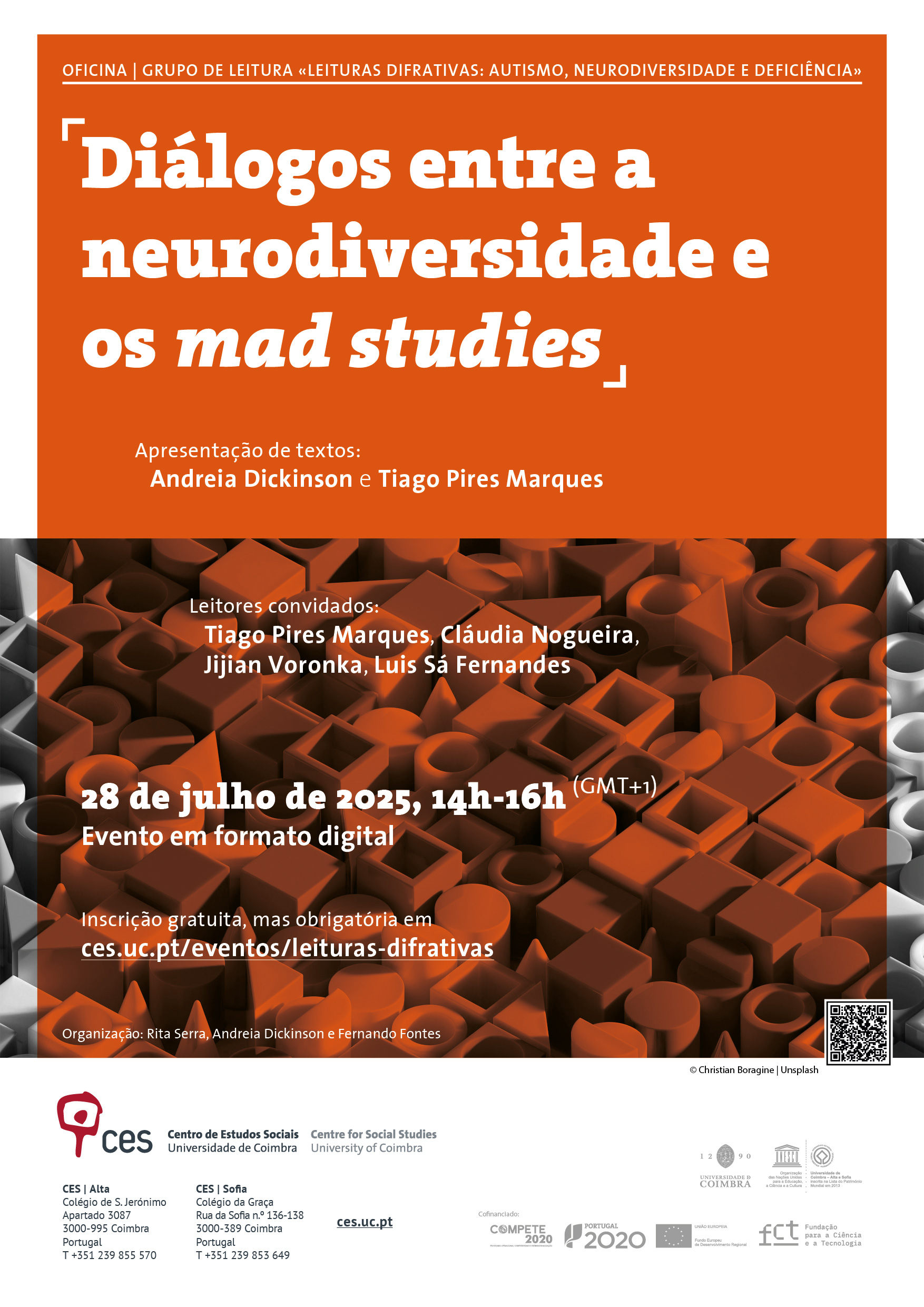Workshop
Dialogues between neurodiversity and mad studies
28 de julho de 2025,
Online
Brigit McWade, Damian Milton & Peter Beresford (2015) Mad studies and neurodiversity: a dialogue, Disability & Society, 30:2, 305-309,
Cook, Tina.(2012) "Where participatory approaches meet pragmatism in funded (health) research: The challenge of finding meaningful spaces." Forum Qualitative Sozialforschung/Forum: Qualitative Social Research. Vol. 13. No. 1.
Presentation of texts: Andreia Dickinson and Tiago Pires Marques
Guest readers: Tiago Pires Marques; Cláudia Nogueira; Jijian Voronka; Luis Sá Fernandes
Registration is free, but mandatory HERE
Bio notes
Cláudia Nogueira, PhD. in Sociology, associate researcher at the Centre for Social Studies of the University of Coimbra and member of the Portuguese team of FRANET (2022-2026) - the multidisciplinary research network of the European Agency for Fundamental Rights. Nogueira has participated in research projects in the field of public policies for mental health and disability. In particular, she took part in a pioneering study in Portugal on psychiatric deinstitutionalisation and, more recently, in the project “Protecting the Fundamental Rights of People with Disabilities Living in Institutions”. Her current research interests include issues related to the critique of biomedical reductionism, integrality in health policies, “other” approaches/epistemologies in the care of psychic suffering and the role of the spiritual dimension in the ethics of care.
Jijian Voronka is an Associate Professor in the Department of Interdisciplinary and Critical Studies at the University of Windsor, Ontario, Canada, Treaty 2 territory. A madwoman for life, her research uses Critical Disability and Mad Studies to explore: the consequences of equity diversity and inclusion practices for disabled people; sites of confinement in the age of deinstitutionalization; and teaching and learning through disability justice frameworks. She is invested in working collaboratively with others who are often labeled difficult or different to co-produce knowledge.
Luís Sá Fernandes, community psychologist and research fellow at the APPsyCI centre at ISPA – Instituto Universitário, in Lisbon. He is currently vice-president of the board of AEIPS (Association for Psychosocial Study and Integration) and a member of the board of FNERDM, the national federation of mental health rehabilitation entities.
His professional and academic career has been dedicated to promoting deinstitutionalisation, empowerment, recovery and community inclusion for people with experience of mental illness. He worked for 15 years at AEIPS, where he directed the centre and community intervention teams for innovative supported employment services, independent housing, family support and self-advocacy groups.
Sá Fernades holds a master's degree in Community Psychology from ISPA, having received a diploma of merit for his research work on the impact of housing and employment on the empowerment of people with mental illness. With teaching experience at ISPA - University Institute, his research has been published in national and international scientific journals. Sá Fernades is proficient in quantitative, qualitative, and mixed methods research. He has also been a member of European projects, such as ImpulSE, focused on supported education, and has collaborated with the Lisbon social network on influencing public policies on mental health.
In addition to his academic, lecturing and professional activities
Tiago Pires Marques, CES associate researcher. Since 2008, he has studied the developments of psi knowledge (psychiatry, psychology and psychoanalysis) and the "manufacturing of the psyche", at the intersection between the history of sciences and the history of religions. Contracted researcher at CES from 2014 to 20124, he developed his socio-historical research on mental health, extending his scope of observation to contemporary times. He is currently investigating the history of mental health models in their relationship with the medicalization of life and the history of human rights. He is especially interested in knowledge, political proposals and alternatives to psychiatry produced by user movements in the field of psychiatry. CURRENT PROJECTS 2019-2024 Psychic Suffering and the Social Question: from Revolution to Collaborative Militancy (Portugal and Brazil, 1970s-2010s). 2021-2022 Ouvir Vozes. Partnership: Marionet, Centre for Social Studies, Rádio Aurora (Júlio de Matos Hospital) and Movimento Ouvir Vozes Portugal. Coordinator: Mário Montenegro (Marionet). 2022-2024 PSYGLOCAL - Psychic suffering and human rights: epistemologies of mental health, public policies, and advocacy in Psychiatry (Lisbon, Portugal and Salvador, Brazil, c. 1950-c.2020.


